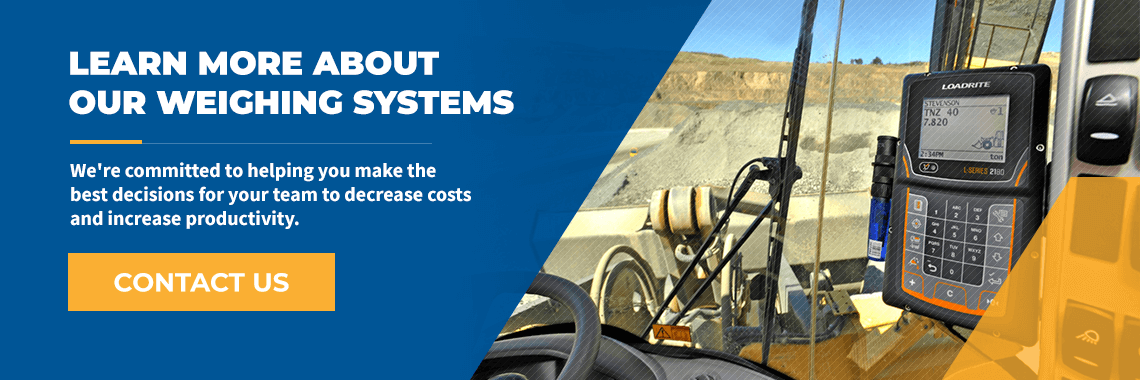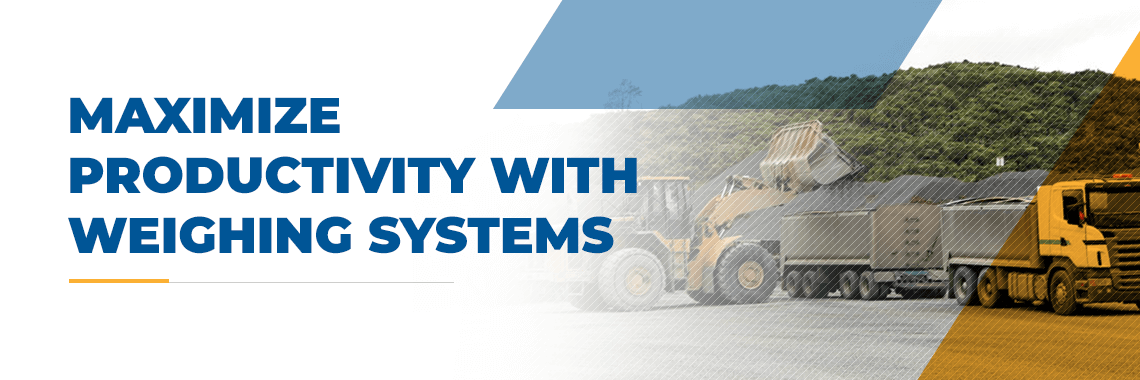
Loading and moving materials on your construction site requires precision. You need to follow specific payload weight and distribution guidelines based on your equipment and the materials you transport to ensure safe, productive project completion.
Your team’s processes may currently rely on assumptions about material density and weight related to the loads your machines can handle. While estimates may have served your business well so far, you could be missing out on prime opportunities to save even more time and money.
Weighing systems help you use your fleet to its fullest potential to capitalize on your equipment investments. Optimize every load you move with high-tech sensors and interconnected scales built right into your machines.
JUMP TO SECTION
Weighing Systems Explained
Weighing systems, also called payload management systems, are scales you can integrate with each piece of equipment, helping you achieve maximum value from your fleet by using it in the most efficient ways possible. They give you an accurate, real-time reading of how much weight a machine is carrying at any time.
Weighing systems also collect and store data, helping you improve future performance and become more profitable and efficient. Tracking your load-related on-site operations lets you take control of your productivity.
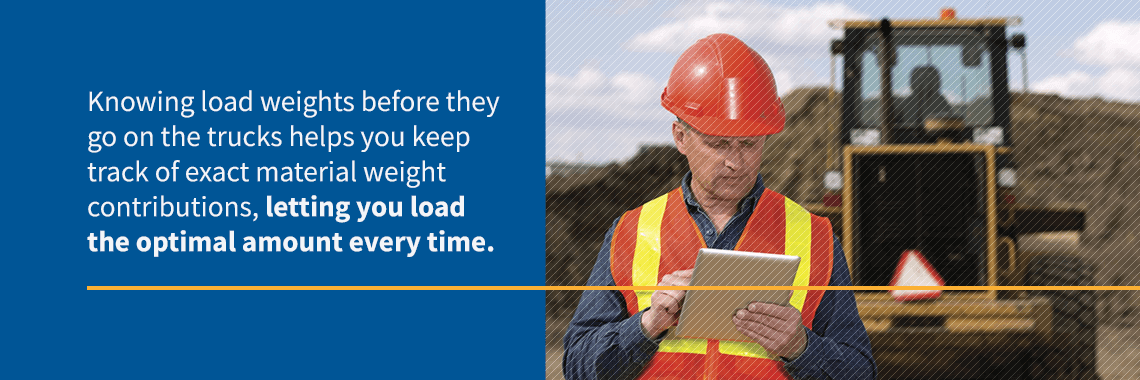
A system of sensors, scales, software and display screens collects and communicates information about load weights. It also provides other useful analytics about how you’re currently using your resources and where you can improve. You can place sensors and scales on loaders, conveyor belts and excavators to get accurate data about the loads you dig and transport. Knowing load weights before they go on the trucks helps you keep track of exact material weight contributions, letting you load the optimal amount every time.
Weighing System Components
Weighing systems are made up of several parts, all communicating with each other to deliver accurate results you can count on. Most weighing systems consist of:
- Scales: Scales built right into your existing machines conveniently measure your loads as soon as you pick them up or drop them off.
- Sensors: Weighing system sensors continuously monitor equipment positions and communicate with onboard scales to accurately gauge load weights. The sensors your system includes will depend on the type of equipment you use to load and transport materials. Multi-point weighing lets machines take averages of weight variations during a lift or dump, accounting for any outliers caused by rough ground conditions or inexperienced operators.
- Indicators: In-cab display screens show operators the system’s readings right where they’re already working instead of pausing operations or getting out of the cab to check weight results. Real-time information about tons, truck counts and time tracking helps your team work more efficiently. Site supervisors can also receive operations updates on their mobile devices so everyone collects project records and stays informed.
- Wireless connection: The parts of a weighing system communicate with each other through a wireless internet signal for fast and easy updates at all times. Some advanced weighing systems can cache data to save your information even during power outages or temporary signal loss or weakness.
How Do Weighing Systems Work?
When a machine picks up a load, the onboard scales immediately calculate its weight. They use data from the sensors to verify accuracy and account for any outliers, then relay the correct information to an in-cab display screen for operators to see while they’re working. Many systems also report this information to off-board site supervisors so they can make planning changes if needed.
Throughout a project, weighing systems help workers identify trends of under- or over-loading and regulate those habits for optimal loads each time. Load data helps teams prevent the long-term consequences of moving too much or too little material at a time.
Weighing systems automatically include the empty tare weight of equipment containers, which can fluctuate based on factors like fuel levels. When determining how much a load weighs, you’ll have to deduct the tare weight from the total the system provides. Figuring out a machine’s tare weight before beginning any operations will ensure accurate numbers once you load the materials.
Weighing System Scales
You can choose from a variety of onboard scales to design the best weighing system configuration for your projects and equipment. Maximize productivity with scales built for all the different machines in your fleet.
Wheel Loader Scales
Scales made specifically for wheel loaders help you load trucks faster and with greater precision. Wheel loader scales provide accurate material weight information even while lifting, moving and dumping materials.
Wheel loaders use sensors around the boom joint to track the boom angle and adjust for ground slope to get the most accurate reading in a variety of conditions. These sensors help the scales compensate for boom height while weighing materials so you always know how much each load weighs.
Belt Scales
Conveyor belt scales help you monitor performance and stockpile inventory in real-time. These scales integrate with your site’s conveyor belts to weigh loads as they travel from one side to the other. Belt scales measure vertical forces to calculate an accurate weight for each load.
Speed sensors under the belts calculate belt speed, flow rate and total load weight. This information, combined with the signals from the scales, tells the system’s integrator, or processing engine, everything it needs to convert signals into understandable data for your team.
Excavator Scales
You can integrate these scales right into your excavators’ frameworks. They help you know exactly how much you’re loading at one time so you can fill the truck to optimal capacities with as few loads as possible.
Much like the wheel loader scales, excavator scales can adjust for different lift heights and terrains throughout the weighing zone, compensating for ground slope and rotation to give you an accurate weight under a variety of operating conditions.
Weighing System Applications
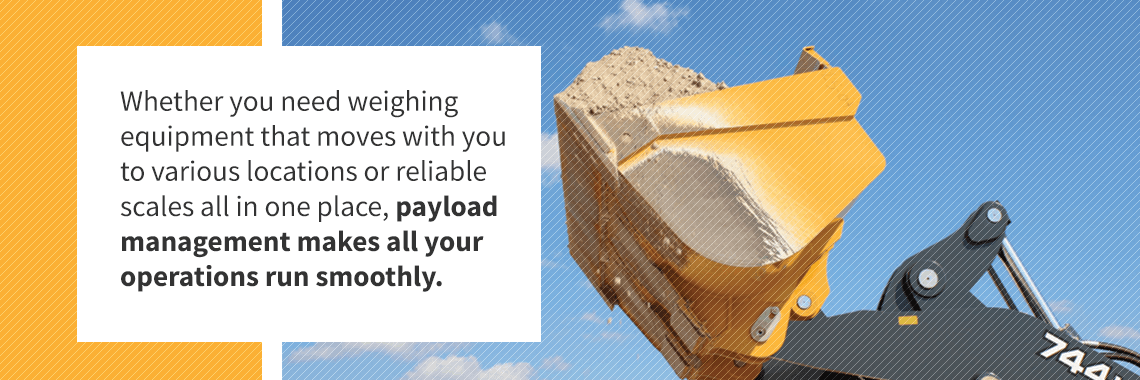
Weighing systems are crucial for many projects, industries and machines. Whether you need weighing equipment that moves with you to various locations or reliable scales all in one place, payload management makes all your operations run smoothly.
Efficient Onroad Equipment
Roads have load limits that road-legal equipment like trucks must follow. Before getting on the road, you must weigh your machines on stationary scales. Machines at or below optimal levels can proceed to the road, while those above the limit must go back to the site and dump excess material before trying again.
When you’re only weighing your trucks at weigh stations, your team risks losing a lot of time. Either your trucks leave under-loaded and need to take more trips to get the job done, or operators take time dumping materials from overloaded trucks, estimating amounts until they get it right.
Onboard weighing systems help you load your trucks correctly the first time, saving time while also saving money on overload fines.
Remote Job Sites
You can track your equipment load data from anywhere. Bring the built-in weighing systems with you to different job sites to ensure accuracy and efficiency wherever your next project takes you.
Permanent Installations
Weighing systems are the best software to put in place at sites you’ll use for a long time, including:
- Quarries: Quarry operations revolve around digging, loading and transporting materials around the site and sending inventory out to other locations. Weighing systems help you automate the weighing process so you can efficiently plan, extract, load out and distribute materials.
- Construction sites: Integrated construction weighing technology helps keep your team on track throughout every project. Optimize each bucket of materials to exact project specifications every time and see how your team’s productivity increases.
- Mines: Optimize your mining operations with weighing software solutions that let you track materials and gather informative data about the inventory you collect and transport.
- Landfills: Reach your target compaction goals faster and more accurately with landfill weighing technology. Link your productivity in the office and on-site with automated features that let you calculate load weight, volume and density.
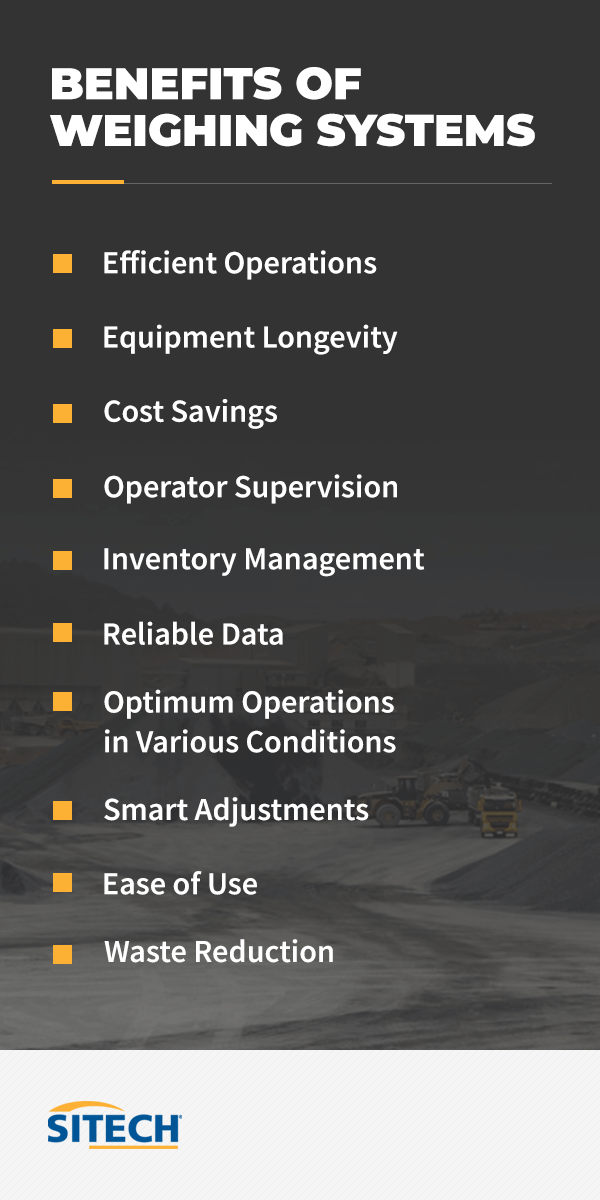
Benefits of Weighing Systems
Your investment in a series of weighing systems for your fleet is one that immediately begins to pay for itself in several ways.
Efficient Operations
Currently, your team may need to estimate the weight of each load. While overestimating the weight can keep you on the safe side, knowing the exact weight allows you to transport larger loads and make fewer trips.
Exact weights help you fill each load to a safe capacity so you can get the job done in less time. Once you know exactly how much to load onto each machine, you can also reduce loading time. Having trusted, immediate feedback lets you fill your machines quickly and confidently, knowing that the software will tell you when to stop.
Equipment Longevity
Loading machines past their capacities can damage them. Loads that surpass your machine’s capacity can cause detrimental stress to internal machine components, undercarriages, axles and tires.
Some equipment may also have specific design limitations to follow for best results, such as the tires’ capacity limits. Scale technology helps you stay within safe load limits so you can keep your fleet in top condition for years to come.
Cost Savings
Increased project efficiency and fewer machine breakdowns help you save money in the long run. When you complete jobs faster and need less maintenance you can dedicate more of your budget to helping your business thrive in other areas. You’ll also decrease your fuel and operating costs for further daily savings.
Operator Supervision
Weighing systems let you monitor individual operators throughout a project to see how they use their time and resources. You can use this information to determine which operators are doing an exceptional job or if your team should be hitting better productivity levels.
Inventory Management
Weighing systems give you automated material tracking for each loader dig and dump. When you fill every load to optimum capacity each time, you’ll create a consistent flow of materials for the software to track and document.
This data can help you determine if you need to cut down on operating costs or improve your hauling methods with new on-site processes. If your project has goals for the amount of material to move each day, you’ll gain a more accurate idea of the areas you need to improve to meet those goals.
The tracking software also lets you see where materials are going, so you can verify that the job is progressing as planned or intervene if you need to modify your operations.
Reliable Data
Counting loads and tracking data by hand can lead to costly errors. Automated systems do this work for you with much higher accuracy, so you know you’re receiving reliable data. Correct information also gives you the chance to conduct accurate analyses, letting you make future project plans with confidence.
Optimum Operations in Various Conditions
Some materials’ weights can change in different weather conditions. For example, density and moisture content can increase during humid days or times of heavy precipitation, making materials much heavier than they are on drier days. Weighing systems always give you an accurate reading so you know how much material to load and move at once, even as those numbers fluctuate.
Smart Adjustments
Some scales include extra features accurate enough to adjust for rough terrain, different operator techniques and optimal loading speeds. Smart scales give you accurate weight readings even while equipment is moving or on a slope. Both new and experienced team members can benefit from time-saving technology that adapts to their working conditions.
Ease of Use
Weighing system software is easy to use and understand, giving you valuable information about your fleet’s progress at a glance. Increase your efficiency with a dashboard that lays out everything you need to know clearly, at all times of the day.
While payload management tools improve everyone’s job performance, they’re especially helpful for newer operators who are still learning how much weight their machines can handle. Weighing systems help newcomers improve their productivity with accurate information to help them learn quickly. All of your workers’ confidence will improve when using machines equipped with weighing systems.
Waste Reduction
Overloading equipment can lead to many pounds of wasted materials. When you know exactly how much material you’re loading and unloading each time, you can tailor your operations to only pick up and transport exactly what you need. Cutting back on waste lets you conserve your resources for future projects.
Learn More About Our Weighing Systems
Payload management weighing systems are the key to making the most of your fleet and moving materials efficiently.
SITECH Southwest has the weighing system solutions you need and professional training with industry experts to help you get the most out of your investment. Browse our extensive range of wheel, belt and excavator scales, and see how our additional weighing technology can improve your site’s operations.
SITECH Southwest is the leading technology solutions provider for a variety of industries, serving Arizona and Southeast California’s construction, mining and landfill needs. We’re committed to helping you make the best decisions for your team to decrease costs and increase productivity.
Contact us today for more information about our weighing systems and other tech services!

